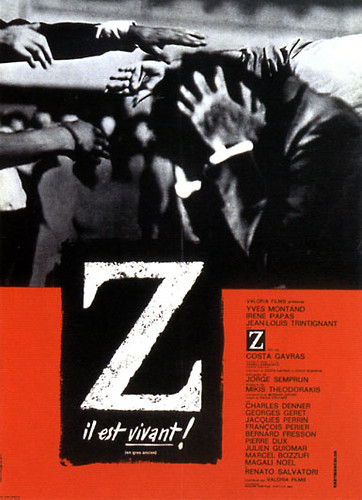
I hate movies. Or rather, I hate several things about the movie experience with the consequence that I seldom enjoy movies and therefore know very little about them. Being dragged along by my bored mother as a child to Hitchcock thrillers convinced me there was always an axe murderer about to pop out on the screen. Additionally, most movies have the same effect on me as unsuccessful literary fiction: I resent the effort to manipulate my emotions with unconvincing human characters and implausible scenarios when reality is both so much more disturbing and more gratifying. Think E.T., for example. Besides all that, most movie showings in theaters are simply too loud; they hurt my ears.
Fortunately for me, our friend and neighbor has recently gotten a big screen TV, a good DVD player, and Netflix; she is trying to educate me about my culture. Last night we joined her to watch Costa-Gavras's Z.
Being a good leftist of the 1960s, I knew the film was an anti-fascist classic and supposed to be very powerful. On its release, reviewer Pauline Kael wrote "Z is almost intolerably exciting - a political thriller that builds up so much tension that you'll probably feel all knotted up by the time it's over." Having seen it, I'm now that much more frightened by contemporary reality, by what is happening here, since I never once felt drawn into the melodrama; we now know that when the good guys go up against the fascists, the good guys are going to get screwed.
It wasn't so in the 1960s. Kael again:
Z is based on the novel by the Greek exile Vassili Vassilikos about the assassination of Gregorios Lambraki, in Salonika, in May, 1963. . . . The investigation of his death uncovered such a scandalous network of corruption and illegality in the police and in the government that the leader of the opposition party, George Papandreou, became Premier. But in April, 1967, the [Greek generals'] military coup d'etat overturned the legal government.
That history remains important, something we should remember, along with the victims. And I'm not saying there weren't good things about Z -- in fact I wish more people would see it in today's political climate.
In particular, I agree strongly with Kael on this: "I don't think Costa-Gavras ever uses violence except to make you hate violence, and such humanitarianism in filmmaking is becoming rare."
The scene that seemed truest for me is the moment, after the politician Z has been murdered, after the inquiring prosecutor has charged the fascist perpetrators with murder, when the puppy-like lawyer who had worked with Z rushes to tell Z's devastated widow this news. He blurts: "it is all so good; it is like he is still alive." The widow, Irene Papas, just looks through him. No, not quite.
When our dreams are smashed, when we've seen the pain humans are willing to inflict on other humans, those dreams can never be put together "good as new." They may, perhaps, give birth to something new, perhaps something even better. But the death is real -- we do not move on into the future without looking at it. I am reminded of a line from the Salvadoran revolutionary poet Roque Dalton: "All together we have more death than they, but all together we have more life than they."
No comments:
Post a Comment